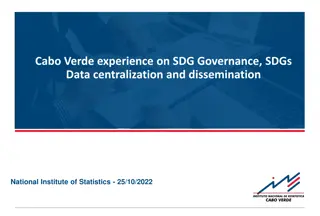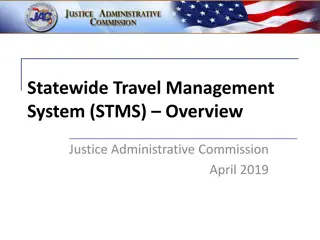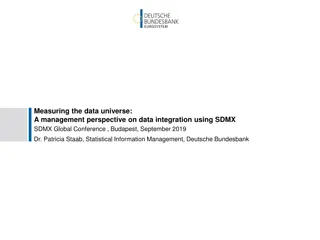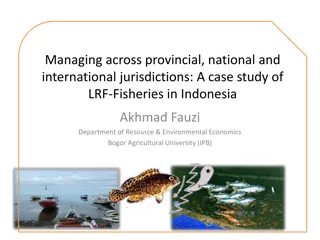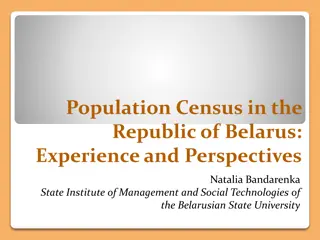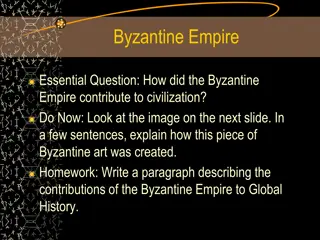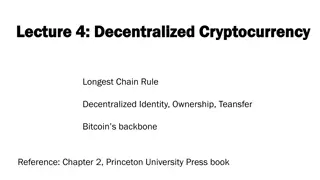Principles of Management
This module explores common organizational structures, the purpose of organization, factors in organizational design, current trends, and the advantages and disadvantages of various structures. It covers specialization, division of labor, hierarchy of authority, centralization, decentralization, for
0 views • 23 slides
Enhancing Governance for Sustainable Development Goals in Cabo Verde
Experience of Cabo Verde on SDG governance, data centralization, and dissemination through a unified statistical report aligning Agendas 2063 and 2030. The National Institute of Statistics plays a vital role in coordinating, compiling, and producing statistical reports, supporting the country's Volu
2 views • 11 slides
Financial Market Infrastructures Policy in South Africa
Financial Market Infrastructures Policy in South Africa as of December 2018 outlines the definition of FMIs, policy objectives, criteria for designation of FMIs, types of FMIs such as payment systems, and proposals related to centralization. The policy emphasizes safety, efficiency, transparency, ac
2 views • 12 slides
Lessons from Mandatory Health Insurance Development and Governance in Estonia
Estonia has implemented a mandatory health insurance system through the Estonian Health Insurance Fund (EHIF) since 1992. The EHIF operates as a single-payer system, pooling public funds predominantly from a 13% payroll tax. Key aspects include high population coverage, independent governance, and f
0 views • 23 slides
Statewide Travel Management System (STMS) Overview
The Statewide Travel Management System (STMS) overview provides insights into the background, implementation, and features of the system. It explains the transition process, user access, and the role of the Department of Management Services (DMS) in managing travel documents. The STMS is designed fo
1 views • 18 slides
Atlantic Seabed Mapping Workshop Summary
Workshop held in Dublin Castle on Dec 2, 2014, discussed current and future plans for seabed mapping in the Atlantic. Key topics included navigational charting, initiatives by various organizations, challenges of disjointed mapping efforts, and proposed actions to address issues. Recommendations inc
1 views • 5 slides
Managing Data Integration: A Management Perspective
The data universe is expanding rapidly, leading to challenges in organizing and extracting valuable information. Dr. Patricia Staab discusses the importance of integrating data using SDMX at the SDMX Global Conference in Budapest. The approach involves moving towards an application-driven architectu
0 views • 12 slides
Overview of the French Education System: Historic Perspectives, Main Steps, and Governance
Historic perspectives trace the evolution of the French Education System from private to public and secular. The main steps outline compulsory education stages from nursery to high school and higher education. The system is structured around freedom, centralization, and autonomy principles, with mor
0 views • 14 slides
Managing LRF-Fisheries in Indonesia: Challenges and Policy Shifts
Indonesia's LRF-Fisheries face challenges from ecological, economic, and social perspectives, with concerns over sustainability due to destructive practices. The management of fisheries has shifted from centralization to decentralization, leading to conflicts over jurisdiction. Despite the lucrative
0 views • 13 slides
Challenges and Opportunities of Devolution in the UK
The challenges and complexities of devolution in the UK are discussed, focusing on the current policy context, proposed government plans, threats, opportunities, and the TUC strategy. Issues such as centralization, dependency on local authorities, regional economic disparities, and the need for cons
0 views • 17 slides
Understanding Network Metrics and Density Analysis
Explore different types of network metrics such as density, centrality, and visualization techniques. Learn how to prepare data for graph-based analysis and understand the concept of network density. Gain insights into measuring network density and centralization in social networks.
0 views • 23 slides
Understanding the State: Definitions, Origins, and Evolution
A state is a complex and powerful social institution, yet its exact definition remains debated. Various scholars, including Woodrow Wilson, Aristotle, and Garner, offer different perspectives on what constitutes a state. The concept of the state dates back to ancient civilizations, emerging from the
0 views • 18 slides
Connections, Succession, and Trade: Insights into Anglo-Saxon England
Anglo-Saxon England in 1066 was a centralized, efficient kingdom vulnerable to invasion. Professor Stephen Baxter discusses the attractive nature of the society to invaders due to its centralization and wealth. The family tree of the Kings of England reveals intricate connections, successions, and a
0 views • 9 slides
Challenges Faced in Higher Education Restructuring: A Case Study
In this case study, the impact of restructuring in higher education at Essex University is explored, focusing on the changes in provision, skills development, and institutional context. The challenges faced post-restructuring include reduced resources, limited scope for embedded teaching, and cuts i
0 views • 17 slides
Political Institutionalization and Coups in Africa: A Study from 2000-2021
This study by Giuseppe Ieraci and Federico Battera explores the relationship between political institutionalization and coups d'état in Africa from 2000 to 2021. It delves into factors such as election regularity, government turnover, centralization of power, and regime instability to understand th
0 views • 9 slides
Energy System Change for Economic Resilience in Vermont
This text discusses the importance of renewable energy transition in Vermont for economic resilience, focusing on the social, political, and cultural dimensions. It highlights the shift from fossil fuel-based to renewable energy systems and the need for inclusive and distributed energy systems to fa
0 views • 14 slides
Population Census in the Republic of Belarus: History, Principles, and Significance
The Population Census in the Republic of Belarus has a rich history, with nine previous counts conducted since 1897. This census provides essential demographic data, including information on sex, age, nationality, education, marital status, and more. The census program in Belarus is based on fundame
0 views • 26 slides
The Contributions of the Byzantine Empire to Civilization
The Byzantine Empire made significant contributions to civilization through art, law, religion, and centralization of government. The empire's legacy includes the preservation of Roman laws, promotion of Christianity, accumulation of church wealth, and establishment of Constantinople as a key center
0 views • 22 slides
Henri Fayol's 14 Principles of Management
Henri Fayol, a prominent figure in management theory, introduced 14 key principles of management that are still relevant today. These principles cover aspects such as centralization, division of work, authority, discipline, unity of command, and more. Fayol's theories have had a significant impact o
0 views • 12 slides
Ancient Sino-Japanese Connectivity: From Yayoi Period to Yamato State
In ancient times, the connectivity between Sino-Japanese cultures shaped the emergence of the Yayoi Period and the formation of the Yamato State. The Yayoi Period marked the influx of cultural influences from China and Korea, leading to the development of a new Japanese culture. This culminated in t
0 views • 15 slides
Decentralized Cryptocurrency and Blockchain Technology
Exploring the concepts of decentralized cryptocurrency, the longest chain rule, ownership transfer, and ScroogeCoin within the context of blockchain technology. Detailed explanations on creating coins, transactions, blocks, and the formation of a tamper-resistant blockchain. The centralization aspec
0 views • 15 slides
Centralization vs Decentralization: A Comparative Analysis
This lecture delves into the dynamics of centralization and decentralization in subnational politics, exploring the benefits of each system, differences between federal and unitary government structures, challenges in reconciling territorial differences, reasons for the increasing popularity of cent
0 views • 15 slides
Influencer Marketing Strategies and Operational Efficiency in Italy
Activating multiple sources through influencer marketing aids in brand awareness and establishing trust. By surrounding potential customers with advocates, the likelihood of brand engagement increases. To ensure success, a consistent approach and industry-standard methodologies are essential. Operat
0 views • 4 slides

